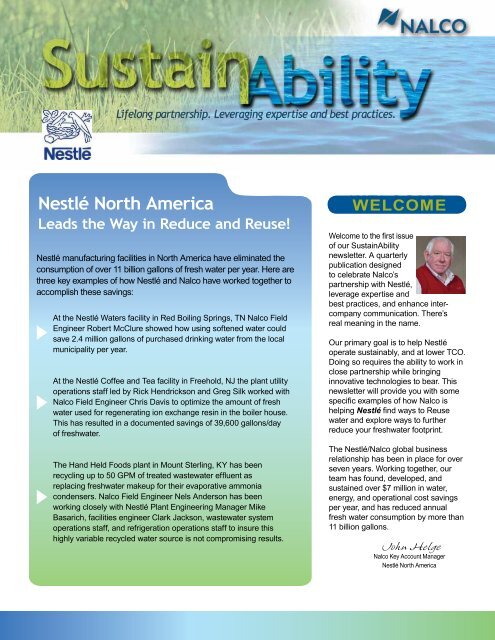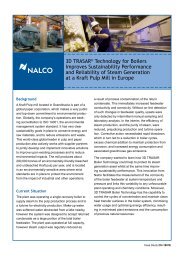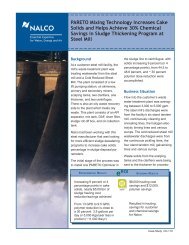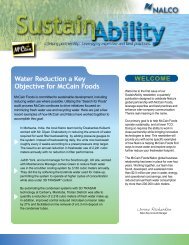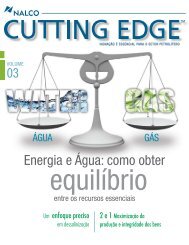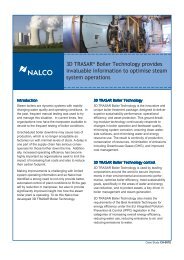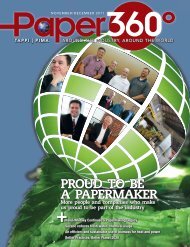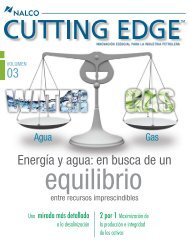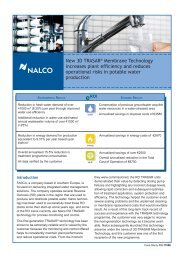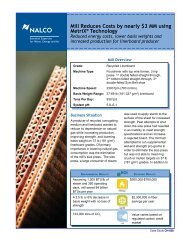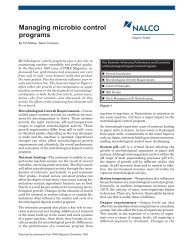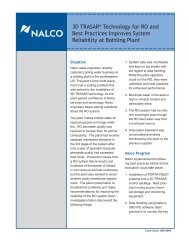Nestlé North America - Nalco
Nestlé North America - Nalco
Nestlé North America - Nalco
You also want an ePaper? Increase the reach of your titles
YUMPU automatically turns print PDFs into web optimized ePapers that Google loves.
<strong>Nestlé</strong> <strong>North</strong> <strong>America</strong><br />
Leads the Way in Reduce and Reuse!<br />
<strong>Nestlé</strong> manufacturing facilities in <strong>North</strong> <strong>America</strong> have eliminated the<br />
consumption of over 11 billion gallons of fresh water per year. Here are<br />
three key examples of how <strong>Nestlé</strong> and <strong>Nalco</strong> have worked together to<br />
accomplish these savings:<br />
At the <strong>Nestlé</strong> Waters facility in Red Boiling Springs, TN <strong>Nalco</strong> Field<br />
Engineer Robert McClure showed how using softened water could<br />
save 2.4 million gallons of purchased drinking water from the local<br />
municipality per year.<br />
At the <strong>Nestlé</strong> Coffee and Tea facility in Freehold, NJ the plant utility<br />
operations staff led by Rick Hendrickson and Greg Silk worked with<br />
<strong>Nalco</strong> Field Engineer Chris Davis to optimize the amount of fresh<br />
water used for regenerating ion exchange resin in the boiler house.<br />
This has resulted in a documented savings of 39,600 gallons/day<br />
of freshwater.<br />
The Hand Held Foods plant in Mount Sterling, KY has been<br />
recycling up to 50 GPM of treated wastewater effluent as<br />
replacing freshwater makeup for their evaporative ammonia<br />
condensers. <strong>Nalco</strong> Field Engineer Nels Anderson has been<br />
working closely with <strong>Nestlé</strong> Plant Engineering Manager Mike<br />
Basarich, facilities engineer Clark Jackson, wastewater system<br />
operations staff, and refrigeration operations staff to insure this<br />
highly variable recycled water source is not compromising results.<br />
WELCOME<br />
Welcome to the first issue<br />
of our SustainAbility<br />
newsletter. A quarterly<br />
publication designed<br />
to celebrate <strong>Nalco</strong>’s<br />
partnership with <strong>Nestlé</strong>,<br />
leverage expertise and<br />
best practices, and enhance inter-<br />
company communication. There’s<br />
real meaning in the name.<br />
Our primary goal is to help <strong>Nestlé</strong><br />
operate sustainably, and at lower TCO.<br />
Doing so requires the ability to work in<br />
close partnership while bringing<br />
innovative technologies to bear. This<br />
newsletter will provide you with some<br />
specific examples of how <strong>Nalco</strong> is<br />
helping <strong>Nestlé</strong> find ways to Reuse<br />
water and explore ways to further<br />
reduce your freshwater footprint.<br />
The <strong>Nestlé</strong>/<strong>Nalco</strong> global business<br />
relationship has been in place for over<br />
seven years. Working together, our<br />
team has found, developed, and<br />
sustained over $7 million in water,<br />
energy, and operational cost savings<br />
per year, and has reduced annual<br />
fresh water consumption by more than<br />
11 billion gallons.<br />
John Helge<br />
<strong>Nalco</strong> Key Account Manager<br />
<strong>Nestlé</strong> <strong>North</strong> <strong>America</strong>
Water Reuse…<br />
moving from compliance to economic benefit<br />
In recent decades, compliance with government wastewater quality requirements has been the primary, and often only, driver of<br />
industrial wastewater treatment programs. But leading industrial operators recognize that compliance alone is not enough and<br />
are moving forward with new wastewater treatment approaches that create economic and environmental benefits.<br />
In some water-stressed regions, leading manufacturers must ask themselves – where is my next drop of water to come from?<br />
The path forward includes:<br />
• increased water recycling and reuse programs to reduce water consumption and discharge needs<br />
• implementation of solid waste (sludge) reduction and waste-to-energy projects<br />
• use of advanced mechanical and chemical treatment technologies and innovations<br />
• focus on reducing energy costs associated with wastewater treatment<br />
Water recycle and reuse programs require a sophisticated knowledge of wastewater treatment, process knowledge,<br />
monitoring and control software and innovative water chemistry and technologies to ensure that water is treated to<br />
“fit for use” levels that protect the environment, product quality and asset integrity.<br />
Some facilities use gray water (wastewater) as the water source for its cooling operations without any performance<br />
deterioration, while significantly reducing fresh water consumption. Water recycle and water reuse – whether in heat-<br />
transfer applications and throughout the production process and for cleaning water use – also cuts down the need for<br />
complex and expensive wastewater treatment.<br />
Plants are working to develop “zero liquid discharge” facilities. The ultimate goal is to minimize water requirements<br />
by reusing and recycling every drop of water they take in until water loss is limited to evaporation.<br />
Technology drivers are helping industry reduce costs. Improved chemistries that capture<br />
tough-to-manage contaminants, equipment advances – along with bio-augmentation programs<br />
and automation technologies that save energy, reduce maintenance and allow for more<br />
water recycling – are all helping to improve the quality and reduce the cost of industrial<br />
wastewater treatment.<br />
No longer is compliance enough<br />
for industry when it comes to<br />
wastewater treatment. Water<br />
scarcity, energy savings, and<br />
increasingly complex industrial<br />
wastewater treatment demands<br />
are pushing industry to implement<br />
new, integrated techniques to<br />
optimize environmental and<br />
economic performance. Advanced<br />
automation, new cooperative<br />
facilities and other technology<br />
and expertise advances will help<br />
industrial operators meet public<br />
needs at reduced economic cost,<br />
helping to facilitate the sustainable<br />
economic and environmental<br />
development.<br />
Recycle<br />
Water reclaimed<br />
as make-up<br />
after quality improvement<br />
Reuse<br />
Water reclaimed as make-up<br />
without any change to its quality<br />
Reduce<br />
Reduced water use through improved operation<br />
of existing equipment and processes<br />
Increased demand may not be able to be met by current fresh water supplies,<br />
or it may become limited by local water use permits. This is the primary economic<br />
driver to consider Reuse on the Water Sustainability Triangle.
Integrated Water Management<br />
reuse, recycle, recover<br />
The <strong>Nalco</strong> Integrated Water Management (IWM) process is a<br />
complete audit-to-operation approach for increased water reuse<br />
and recycling. We package <strong>Nalco</strong>’s global expertise into a single<br />
offering by selecting the best technology, chemistry and expertise<br />
required for long-term sustainable solutions, improving profitability<br />
and environmental performance. These solutions can be<br />
standardized enterprise wide and are fully supported at the<br />
individual facility level, anywhere in the globe.<br />
The <strong>Nalco</strong> IWM process identifies the technology, chemistry and<br />
expertise required for long-term sustainable solutions, improving<br />
profitability and environmental performance. We start with a<br />
customized IWM audit by a team of industry experts that includes:<br />
• Site survey and water audit<br />
• Plant resources modeling for water discharge options<br />
• Feasibility study<br />
• Pilot scale evaluation<br />
• Conceptual and Final Design<br />
• Commissioning support<br />
Industry-Specific Experience<br />
Knowledge of water: process to waste/waste to utilities<br />
Design-Build-Own-Operate-Maintain (DBOOM) Services<br />
Advanced System Modeling (risk assessment)<br />
Control and Monitoring Platforms for variable water<br />
streams into utility systems<br />
Onsite Services<br />
Non-biased Technology Solutions<br />
(Mechanical-Operational-Chemical)<br />
Why <strong>Nalco</strong><br />
Industry-Specific Experience<br />
<strong>Nalco</strong> & Partners !<br />
We continue to offer our expert support after the project is completed to ensure that it works as designed and delivers<br />
optimal operational efficiency.<br />
<strong>Nestlé</strong>’s goals are our goals<br />
<strong>Nalco</strong> has partnered with industrial and institutional customers worldwide to develop reliable, cost-effective and<br />
safe solutions. We help you:<br />
Equipment<br />
Companies<br />
Highly Capable Marginally Capable Not Capable<br />
Increase profitability – IWM helps you reduce both fresh water consumption and waste treatment/wastewater discharge costs.<br />
Improve quality – IWM helps you improve the quality of feed water, treated and recycled water, process and rinse water and, most<br />
importantly, your end product.<br />
Increase productivity – IWM helps you increase productivity by reducing water-related shutdown and associated production<br />
losses; increasing cooling tower cycles of concentration and plant cooling efficiency; upgrading boiler water quality and reducing<br />
steam-related production downtime and energy wastage due to blowdown; and achieving best-in-class water efficiency.<br />
Meet environment, health and safety standards – IWM helps you meet or exceed your environmental goals and reduce<br />
environmental and health risks<br />
Considering a project? Let <strong>Nalco</strong> help!<br />
Call John Helge (616-915-2403)<br />
or email jhelge@nalco.com.<br />
Consulting<br />
Companies<br />
Chemical<br />
Suppliers
Getting the Most from the<br />
<strong>Nestlé</strong>/<strong>Nalco</strong> Business Partnership<br />
The key to documented success in the <strong>Nestlé</strong>/<strong>Nalco</strong> business relationship is the close working relationship between<br />
the operating, maintenance, and technical staffs at each <strong>Nestlé</strong> facility and the local <strong>Nalco</strong> field support engineers.<br />
In this issue, we talked about the importance of water reuse and recycle and how the impact of the <strong>Nestlé</strong>/<strong>Nalco</strong><br />
partnership has resulted in annual fresh water savings of more than 11 billion gallons. There is no reason why we<br />
can’t replicate this success at every <strong>Nestlé</strong> facility.<br />
Each <strong>Nalco</strong> field support engineer has access to technical information for sharing ideas, problem-solving and<br />
leveraging best practices worldwide in real time. These local field engineers give <strong>Nestlé</strong> the biggest “bang for<br />
the buck” as proactive problem prevention specialists who provide on-site training, support and guidance to the<br />
<strong>Nestlé</strong> facility staff responsible for day-to-day monitoring and control of water-related processes.<br />
Key stakeholders from <strong>Nestlé</strong> facilities that utilize <strong>Nalco</strong> products should participate at least annually in a Business<br />
Review meeting in which the local <strong>Nalco</strong> field support engineer will review progress on mutually agreed upon<br />
Key Performance Indicators and provide recommendations for future opportunities for improvement in water,<br />
energy, and chemical consumption. The <strong>Nalco</strong> field support engineer will follow this Service Action Plan and<br />
document progress on each site visit in a Service Report.<br />
This process is the cornerstone of the <strong>Nestlé</strong>/<strong>Nalco</strong> partnership – one that delivers documented results that allow<br />
<strong>Nestlé</strong> to achieve its business goals. If at any time you feel <strong>Nalco</strong> should improve any aspect of our performance<br />
for your facility do not hesitate to contact me directly to expedite response to your needs.<br />
Essential Expertise<br />
SM<br />
for Water, Energy and Air<br />
NALCO COMPANY OPERATIONS<br />
<strong>North</strong> <strong>America</strong>: Headquarters –1601 West Diehl Road • Naperville, Illinois 60563-1198 • USA<br />
Energy Services Division – 7705 Highway 90-A • Sugar Land, Texas 77478 • USA<br />
Europe: Ir.G.Tjalmaweg 1 • 2342 BV Oegstgeest • The Netherlands<br />
Asia Pacific: 2 International Business Park • #02-20 The Strategy Tower 2 • Singapore 609930<br />
Latin <strong>America</strong>: Av. das Nações Unidas 17.891 • 6° Andar 04795-100 • São Paulo • SP • Brazil<br />
www.nalco.com<br />
NALCO, the logo and the tagline are trademarks of <strong>Nalco</strong> Comapny.<br />
©2011 <strong>Nalco</strong> Company All Rights Reserved ADV-1308<br />
John Helge<br />
jhelge@nalco.com<br />
616-915-2403


